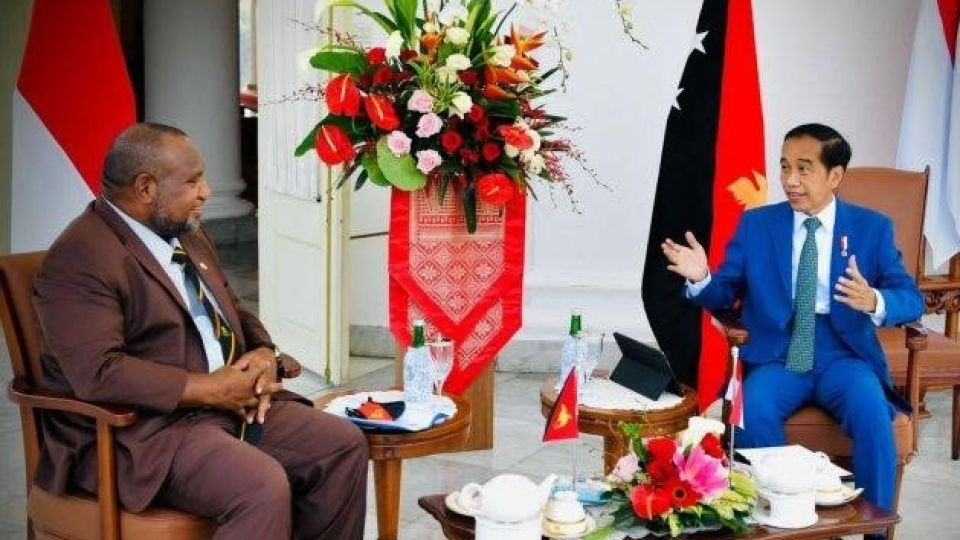March 24, 2023
JAKARTA – With heightened tensions in the Indo-Pacific and recent developments in Papua, Indonesia stands to benefit from deeper engagement with Pacific island nations, experts have said, following Papua New Guinea Foreign Minister Justin Tkatchenko’s Tuesday visit to Bogor, West Java.
Tkatchenko’s arrival for the third Joint Ministerial Commission (JMC) between Indonesia and PNG came as Indonesia grapples with both internal and external incidents, including the kidnapping of a New Zealand pilot by armed separatists in Papua and an increasingly polarized Indo-Pacific amid the United States-China rivalry.
Foreign Minister Retno LP Marsudi told reporters shortly after the JMC meeting that cooperation in the fields of trade, development and Pacific affairs had been discussed, adding that a good relationship between Jakarta and Port Moresby was “part and parcel of a stable and prosperous Indo-Pacific”.
“Papua New Guinea is a close neighbor of Indonesia and we share a long land border. [It] is also Indonesia’s strategic partner in forging deeper partnerships with the Pacific countries,” said Retno.
Meanwhile, Tkatchenko added that a closer working relationship with Indonesia would improve Papua New Guinea’s economy and security.
“We see Indonesia as a very strategic and powerful partner. It remains our traditional ally, and we hope to continue the relationship far in the future,” he said.
The pair of foreign ministers also signed two bilateral agreements, one pertaining to diplomatic visa exemptions and another on points of accord in existing border disputes.
The countries share a border at least 760 kilometers long, a largely Dutch colonial-era line cutting through mountains and dense jungles periodically reviewed by Jakarta and Port Moresby.
The border remains an issue for both countries, though there is a “continuing positive trend” along some stretches of the frontier, including the Wutung-Skuow border crossing, which has seen an increased number of PNG citizens visiting the Skouw market on the Indonesian side, Retno said.
“As ASEAN chair, Indonesia aims to promote closer engagement between ASEAN and Pacific countries, including by encouraging secretariat-to-secretariat cooperation between ASEAN and the Pacific Islands Forum (PIF),” she said.
“We share the same vision: that the voice of the Pacific must be heard in addressing common global challenges.”
Achilles heel
In recent years, Jakarta has increased its engagement with Pacific island nations, with Indonesia taking advantage of its 2022 Group of 20 presidency to invite leaders from the region to share their concerns.
The continuation of such efforts is “extremely important”, said National Research and Innovation Agency (BRIN) senior international relations expert Dewi Fortuna Anwar, adding that it would secure both regional security and Indonesia’s national interests.
She told The Jakarta Post on Thursday that Indonesia should invest as much time in its relationship with Pacific island nations as with its neighbors to the north, adding that they were similarly prone to becoming theaters of the US-China rivalry.
This month, China’s special envoy to the Pacific islands, Qian Bo, visited a number of countries in the region, including Papua New Guinea, in an effort to boost Beijing’s presence in the region. The visit was followed by Australian Prime Minister Anthony Albanese’s visit to Fiji, as well as US White House Indo-Pacific coordinator Kurt Campell’s stopover in the Solomon Islands.
Another elephant in the room, Dewi said, was the relationship between Pacific island nations and the separatist Free Papua Movement (OPM).
“It is always a worry that the Pacific island nations could provide refuge to OPM fighters or give forms of logistical support,” Dewi noted.
Recent developments in Papua have not helped Jakarta’s position, with the kidnapping of a New Zealand-national pilot in February and the Fijian government’s recent public expression of support for the OPM.
For decades, the topic of Papua has been a diplomatic Achilles heel for Indonesia, with numerous international actors demanding accountability in response to reports of human rights abuses inflicted by Indonesian authorities.
Ahead of his visit, Tkatchenko said the leaders would discuss West Papua, PNG media outlet Loop reported, adding that he would express Port Moresby’s readiness to assist Indonesia in the matter.
“There have been a lot of allegations about human rights issues that have been brought up with the Pacific Islands Forum and also with the governments, previous governments, [of] Papua New Guinea over many years,” said Tkatchenko.
The details of the ministers’ Papua discussion remain unclear, and Retno’s comments after the meeting hewed to the government’s typical line.
“Indonesia highly appreciates Papua New Guinea’s strong and consistent support for Indonesia’s sovereignty and territorial integrity,” she said.
Despite the unresolved issues, both Retno and Tkatchenko said the two neighbors would continue to work on expanding their partnership, including “concrete steps” to start negotiations for a preferential trade agreement (PTA) and investment in the energy, telecommunications and pharmaceutical sectors.
“Papua New Guinea will always be one of Indonesia’s closest neighbors and strategic partners. Indonesia stands ready to continue fostering our close cooperation based on mutual respect, trust and benefit,” Retno said.


